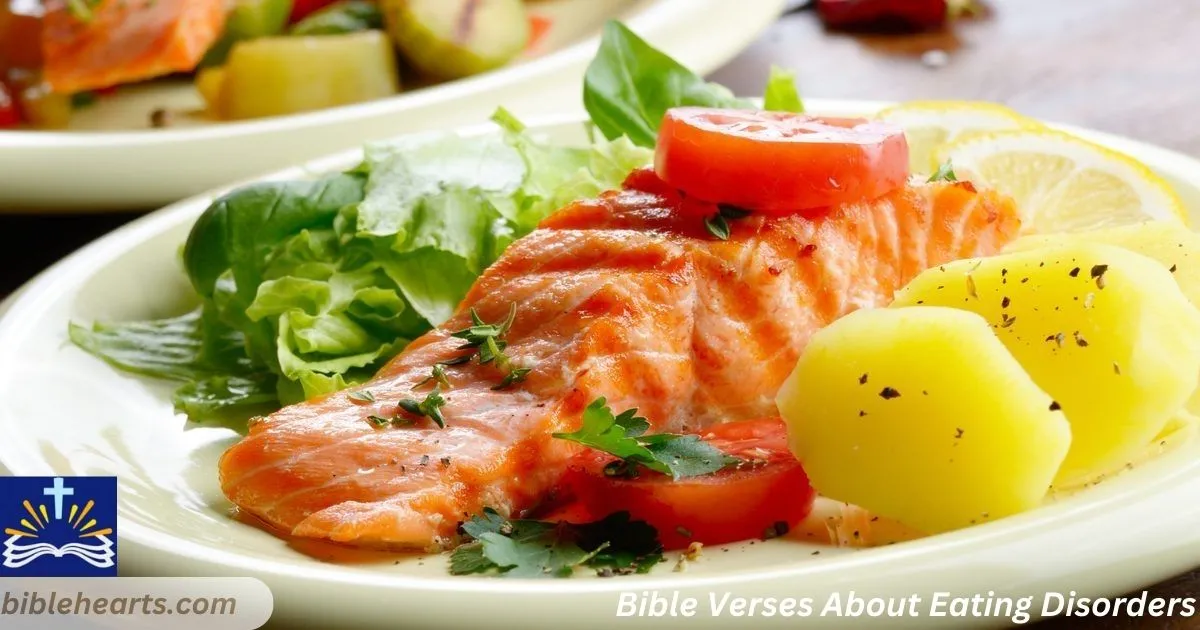“Finding solace and guidance in scripture can be a source of strength and healing for those struggling with eating disorders.”
Eating disorders are complex and challenging conditions that affect many people, impacting their physical, emotional, and spiritual well-being. Navigating through these struggles requires not only medical and psychological support but also spiritual guidance.
The Bible provides valuable wisdom and encouragement for those seeking healing and wholeness. Scripture offers insights into the nature of our bodies, the importance of self-care, and the transformative power of God’s love.
Understanding how biblical principles apply to issues of health and self-image can provide a deeper sense of purpose and support. By exploring relevant Bible verses, individuals dealing with eating disorders can find reassurance and practical guidance to aid their recovery journey.
This article will delve into key scriptures that address the relationship between faith, health, and self-care, offering a scriptural perspective on overcoming eating disorders.
1. The Value of Our Bodies
Recognizing the intrinsic value of our bodies as temples of the Holy Spirit is a foundational step towards healing.
- 1 Corinthians 6:19-20: “Do you not know that your bodies are temples of the Holy Spirit, who is in you, whom you have received from God? You are not your own; you were bought at a price. Therefore honor God with your bodies.”
- Psalm 139:14: “I praise you because I am fearfully and wonderfully made; your works are wonderful, I know that full well.”
- Romans 12:1: “Therefore, I urge you, brothers and sisters, in view of God’s mercy, to offer your bodies as a living sacrifice, holy and pleasing to God—this is your true and proper worship.”

- Genesis 1:31: “God saw all that he had made, and it was very good. And there was evening, and there was morning—the sixth day.”
- Proverbs 3:7-8: “Do not be wise in your own eyes; fear the Lord and shun evil. This will bring health to your body and nourishment to your bones.”
- 1 Thessalonians 5:23: “May God himself, the God of peace, sanctify you through and through. May your whole spirit, soul and body be kept blameless at the coming of our Lord Jesus Christ.”
Real-Life Example
Understanding and valuing your body as a creation of God can be a powerful motivator for self-care and recovery. For instance, recognizing your body as a temple of the Holy Spirit can inspire you to treat it with respect and care, which includes seeking appropriate help for eating disorders.
2. The Importance of Healthy Eating
Scripture encourages us to practice moderation and gratitude in our approach to food and nourishment.
- 1 Timothy 4:4-5: “For everything God created is good, and nothing is to be rejected if it is received with thanksgiving, because it is consecrated by the word of God and prayer.”
- Proverbs 25:27: “It is not good to eat too much honey, nor is it honorable to search out matters that are too deep.”
- Philippians 4:12-13: “I know what it is to be in need, and I know what it is to have plenty. I have learned the secret of being content in any and every situation, whether well fed or hungry, whether living in plenty or in want. I can do all this through him who gives me strength.”

- Matthew 6:11: “Give us today our daily bread.”
- Psalm 34:8: “Taste and see that the Lord is good; blessed is the one who takes refuge in him.”
- Deuteronomy 8:3: “He humbled you, causing you to hunger and then feeding you with manna, which neither you nor your ancestors had known, to teach you that man does not live on bread alone but on every word that comes from the mouth of the Lord.”
Real-Life Example
Practicing mindful eating and expressing gratitude for the nourishment you receive can help foster a healthier relationship with food. For example, focusing on the purpose of food as a means of sustenance and not as a source of guilt can contribute to healing from an eating disorder.
3. Overcoming Fear and Anxiety
Finding peace and reassurance in God’s promises helps overcome fears related to eating and body image.
- Matthew 6:25-26: “Therefore I tell you, do not worry about your life, what you will eat or drink; or about your body, what you will wear. Is not life more than food, and the body more than clothes? Look at the birds of the air; they do not sow or reap or store away in barns, and yet your heavenly Father feeds them. Are you not much more valuable than they?”
- 1 Peter 5:7: “Cast all your anxiety on him because he cares for you.”
- Philippians 4:6-7: “Do not be anxious about anything, but in every situation, by prayer and petition, with thanksgiving, present your requests to God. And the peace of God, which transcends all understanding, will guard your hearts and your minds in Christ Jesus.”
- Isaiah 41:10: “So do not fear, for I am with you; do not be dismayed, for I am your God. I will strengthen you and help you; I will uphold you with my righteous right hand.”
- Psalm 55:22: “Cast your cares on the Lord and he will sustain you; he will never let the righteous be shaken.”
- John 14:27: “Peace I leave with you; my peace I give you. I do not give to you as the world gives. Do not let your hearts be troubled and do not be afraid.”
Real-Life Example
Using prayer and meditation to address fears and anxieties about food and body image can be effective. For instance, when feeling overwhelmed, turning to scripture for comfort and reassurance can provide a sense of peace and calm.
How is the Bible Unique? Complete Data Guide!
4. Embracing Forgiveness and Self-Compassion
Accepting forgiveness and showing compassion to oneself is crucial in the healing process.
- Psalm 103:12: “As far as the east is from the west, so far has he removed our transgressions from us.”
- Isaiah 43:25: “I, even I, am he who blots out your transgressions, for my own sake, and remembers your sins no more.”
- Ephesians 4:32: “Be kind and compassionate to one another, forgiving each other, just as in Christ God forgave you.”
- Luke 6:36: “Be merciful, just as your Father is merciful.”
- Colossians 3:13: “Bear with each other and forgive one another if any of you has a grievance against someone. Forgive as the Lord forgave you.”
- Matthew 6:14-15: “For if you forgive other people when they sin against you, your heavenly Father will also forgive you. But if you do not forgive others their sins, your Father will not forgive your sins.”
Real-Life Example
Practicing self-forgiveness and compassion can be transformative. For example, when struggling with negative self-talk, reminding yourself of God’s forgiveness and love can help build a healthier self-image and support recovery.
5. Seeking Support and Community
Connecting with others for support and encouragement is an essential part of healing.
- Galatians 6:2: “Carry each other’s burdens, and in this way, you will fulfill the law of Christ.”
- Hebrews 10:24-25: “And let us consider how we may spur one another on toward love and good deeds, not giving up meeting together, as some are in the habit of doing, but encouraging one another—and all the more as you see the Day approaching.”
- Proverbs 27:17: “As iron sharpens iron, so one person sharpens another.”
- Ecclesiastes 4:9-10: “Two are better than one, because they have a good return for their labor: If either of them falls down, one can help the other up.”
- James 5:16: “Therefore confess your sins to each other and pray for each other so that you may be healed. The prayer of a righteous person is powerful and effective.”
- 1 Thessalonians 5:11: “Therefore encourage one another and build each other up, just as in fact you are doing.”
Real-Life Example
Joining a support group or faith-based community can provide emotional and practical support. Engaging with others who understand your struggles can offer encouragement and accountability in your healing journey.
6. Cultivating a Positive Self-Image
Embracing a positive self-image rooted in God’s love and acceptance can aid in overcoming eating disorders.
- Zephaniah 3:17: “The Lord your God is with you, the Mighty Warrior who saves. He will take great delight in you; in his love he will no longer rebuke you, but will rejoice over you with singing.”
- Ephesians 2:10: “For we are God’s handiwork, created in Christ Jesus to do good works, which God prepared in advance for us to do.”
- Psalm 139:13-14: “For you created my inmost being; you knit me together in my mother’s womb. I praise you because I am fearfully and wonderfully made; your works are wonderful, I know that full well.”
- Romans 8:16: “The Spirit himself testifies with our spirit that we are God’s children.”
- 2 Corinthians 5:17: “Therefore, if anyone is in Christ, the new creation has come: The old has gone, the new is here!”
- 1 John 3:1: “See what great love the Father has lavished on us, that we should be called children of God! And that is what we are!”
Real-Life Example
Fostering a positive self-image can be supported by focusing on your identity in Christ. For example, daily affirmations of God’s love and acceptance can help reshape how you view yourself, supporting recovery from an eating disorder.
How can I find comfort in the Bible while dealing with an eating disorder?
Finding comfort in the Bible during struggles with an eating disorder involves reflecting on scriptures that affirm the value of your body, encourage healthy eating habits, and offer peace and forgiveness.
Embracing God’s promises, seeking support from the faith community, and cultivating a positive self-image can provide solace and guidance in the recovery process.
Answers to Key Questions Bible Verses About Eating Disorders
1. What does the Bible say about the value of our bodies?
The Bible teaches that our bodies are temples of the Holy Spirit and should be honored and cared for (1 Corinthians 6:19-20).
2. How does the Bible address the issue of unhealthy eating habits?
Scripture encourages moderation and gratitude in eating, and teaches that food should be received with thanksgiving (1 Timothy 4:4-5).
3. What are biblical ways to overcome fear and anxiety related to eating disorders?
The Bible advises casting your anxieties on God and finding peace through prayer and trust in His promises (Philippians 4:6-7).
4. How can forgiveness and self-compassion support healing from an eating disorder?
Embracing forgiveness from God and showing compassion to oneself are crucial for healing and overcoming guilt and shame (Ephesians 4:32).
5. Why is community support important in dealing with eating disorders according to the Bible?
Scripture highlights the importance of supporting and encouraging one another, which can be vital for emotional and practical support during recovery (Galatians 6:2).
Conclusion
Navigating the challenges of eating disorders can be daunting, but the Bible offers profound wisdom and encouragement for healing. By understanding the value of our bodies, practicing healthy eating, overcoming fear, embracing forgiveness, seeking support, and cultivating a positive self-image, individuals can find solace and strength in scripture.
Through faith and application of biblical principles, it is possible to embark on a journey towards health and wholeness, supported by the comforting and guiding words of God.

Hi! I’m Zaide Smith, the admin of Bibblehearts.com, where I strive to curate engaging content that inspires and connects our readers. With a passion for storytelling and community building, I’m dedicated to fostering a welcoming space for all.










